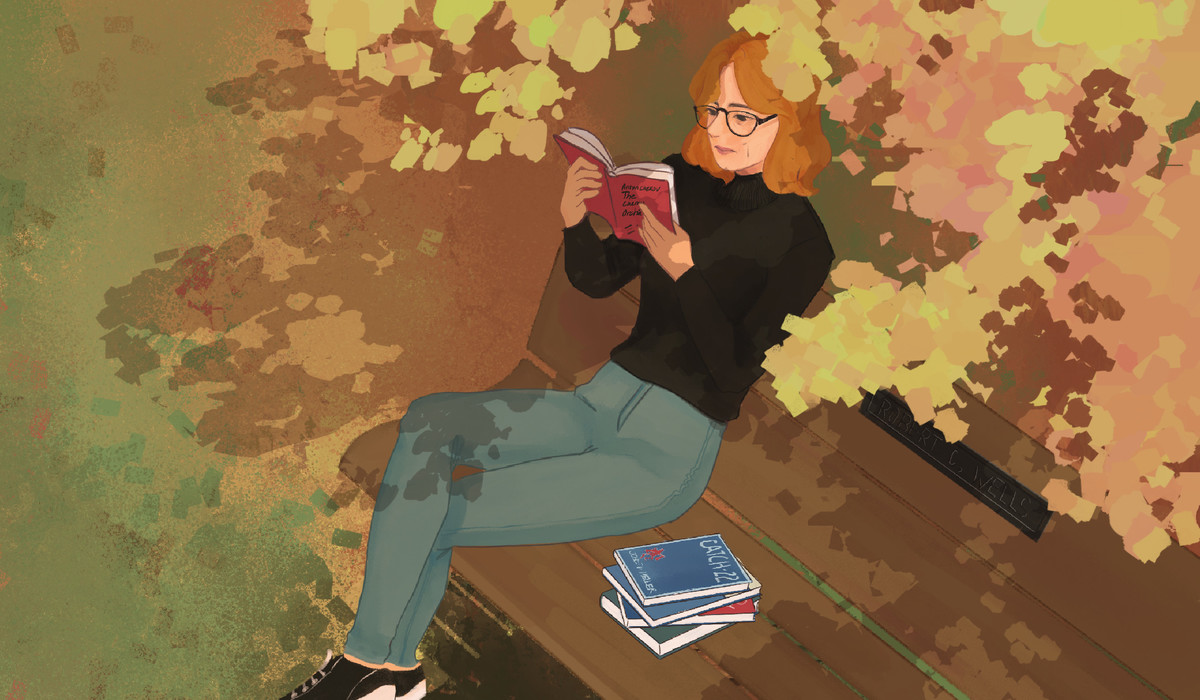Over the past 25 years, my family and I have found a treasured refuge in Ann Arbor’s Gallup Park — home to playgrounds, a boat livery, picnic areas, and walking paths. And, as I more recently discovered, it’s the location of a bench that memorializes one of my favorite U-M professors: Robert P. Weeks.
In 1978, when I entered the College of Engineering, I was excited to study “important” subjects, beginning with prerequisites in advanced math, chemistry, and physics and onto engineering courses that would eventually lead to a well-paying job. As someone with a deep-seated aversion to English classes, I was annoyed by the seemingly pointless graduation requirement of completing four semesters of humanities.
As good fortune would have it, first semester of freshman year, I landed in Professor Weeks’ section of “Humanities 101.” I recall reading Homer’s “The Iliad,” passages from the Old and New Testament, works by Sophocles and Plato, and Chaucer’s “The Canterbury Tales.” I spent hours wrestling with the meaning of the assigned texts. I cared little about my grade. My main goal was to contribute an idea, observation, or interpretation that would capture Professor Weeks’ attention.
His enthusiasm for literature was only mildly contagious. What endeared him to my peers and me was his appreciation of his students. We had no new insights, no startling revelations, no compelling arguments to insert into the classroom discourse. But Professor Weeks made us feel like we might.
Fast forward to the second semester of my junior year, when I needed to finish my humanities requirements. Scanning the catalog for possible options, I noticed a class titled “Great Books.” The course description included a long list of authors to be explored. This gave me pause. However, because Professor Weeks would be leading the battle, I decided to enlist.
That semester, we read four novels: “Catch-22” by Joseph Heller, “The Sound and the Fury” by William Faulkner, “The Portrait of the Artist as a Young Man” by James Joyce, and “The Adventures of Huckleberry Finn” by Mark Twain. We also read shorter works by 21 other authors. I can revisit the complete lineup by perusing the textbook that we used. My cherished copy still contains underlined passages, notes in the margins, and highlighted vocabulary words that I needed to look up.
Contemplating this reading list is somewhat overwhelming, not only because we covered an impressive expanse of literary ground but also because I know the extent to which those few fleeting months of bookish immersion influenced the next four decades of my life. Unwittingly, Professor Weeks ignited my still-burning love of reading and books of all genres.
In my view, he exhibited the most important qualities of an effective educator. He enjoyed his subject matter, loved teaching, and was excited by his students. His engaging and often humorous lectures provided background about the authors’ lives and interpretations of their works. In contrast, however, after delivering a particularly comprehensive analysis and gathering our impressions, he might end by politely expressing the idea that the notable critics, and even he himself, were quite possibly full of shit. If ever I had a professor that didn’t take himself too seriously, it was Professor Weeks.
In addition to learning about the authors that semester, we studied the craft of writing, covering topics such as point of view, character development, and symbolism. Near the end of the semester, we received the horrifying assignment of writing our own short story. Despite my earnest and concerted efforts, my story stunk and I knew it. I could either receive a zero or reveal my ineptitude by handing it in. I swallowed my pride and wincingly left the poisonous final draft among a stack of submissions on Professor Weeks’ desk.
The one thing that lessened the sting of humiliation is that Professor Weeks didn’t seem bothered by our feeble attempts at fiction. I imagine he was used to the lackluster output of most engineers. He distributed copies of two of the better attempts and went over their strengths with us. It was instructive in ways that studying the works of the pros had not been. In an odd way, Professor Weeks freed me from my own, self-imposed limitations by showing me that it didn’t matter if I was a slow reader, unremarkable reviewer, or below-average writer. What did matter was that I was thoroughly enjoying an English class for the first time in my life.
I long regretted failing to convey my heartfelt thanks to my beloved humanities professor and clueing him into the extent of his influence. I remember the last time we parted ways. Then in graduate school, I ran into him ascending the stairs of what was then the East Engineering Building. He asked me what I’d been up to. I told him I was working on my master’s degree, apologetically explaining that I was taking an extra semester since I’d recently gotten married.
“Did you marry the young man that I always used to see you with after class?” he asked, referring to my high school sweetheart. “No,” I replied. “I’m married to Andy Seidl. He took your ‘Great Books’ class last fall based on my glowing recommendation.”
“Hmmmph,” he shrugged. He seemed by turns surprised, then slightly disappointed, then thoroughly pleased. Something about his chuckle as he continued on down the steps let me know, it was all good.
Carol A. Seidl, ’82, MSE’84, is a serial software entrepreneur, blogger, freelance writer and translator, and mother. She also holds an master’s in French. This essay is adapted from a post on her blog, Cas d’Intérêt: Reflections of a Francophile.





